Top Rankings
Fort Leavenworth School District ranks among the top 20% of public school district in Kansas for:
Category
Attribute
Overall Rank
Highest overall rank (Top 1%)
Math Proficiency
Highest math proficiency (Top 1%)
Reading/Language Arts Proficiency
Highest reading/language arts proficiency (Top 1%)
Science Proficiency
Highest science proficiency (Top 1%)
Diversity
Most diverse schools (Top 1%)
For the 2025 school year, there is 1 public high school serving 421 students in Fort Leavenworth School District.
Public High School in Fort Leavenworth School District have an average math proficiency score of 59% (versus the Kansas public high school average of 21%), and reading proficiency score of 53% (versus the 26% statewide average).
Minority enrollment is 34% of the student body (majority Hispanic), which is less than the Kansas public high school average of 37% (majority Hispanic).
Overview
This School District
This State (KS)
# Schools
4 Schools
403 Schools
# Students
1,648 Students
163,604 Students
# Teachers
135 Teachers
10,703 Teachers
Student : Teacher Ratio
12:1
12:1
District Rank
Fort Leavenworth School District, which is ranked within the top 1% of all 286 school districts in Kansas (based off of combined math and reading proficiency testing data) for the 2021-2022 school year.
Overall District Rank
#2 out of 286 school districts
(Top 1%)
(Top 1%)
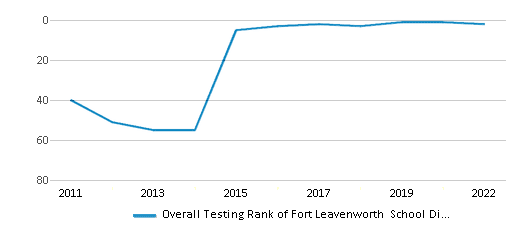
Math Test Scores (% Proficient)
67%
29%
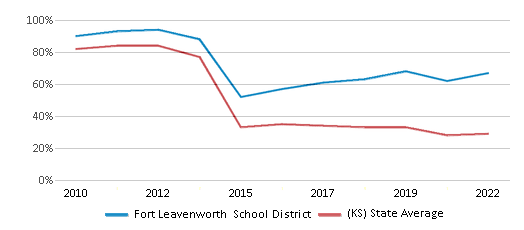
Reading/Language Arts Test Scores (% Proficient)
65%
32%
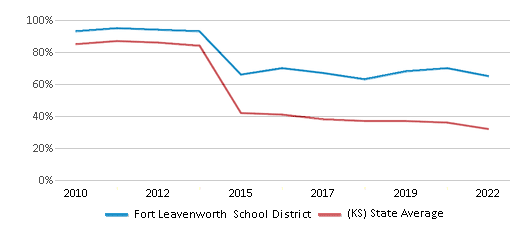
Science Test Scores (% Proficient)
55%
31%
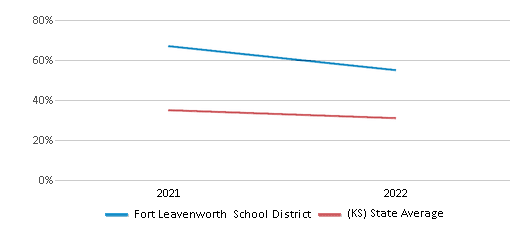
Students by Ethnicity:
Diversity Score
0.55
0.55
# American Indian Students
6 Students
1,367 Students
% American Indian Students
n/a
1%
# Asian Students
48 Students
4,476 Students
% Asian Students
3%
3%
# Hispanic Students
262 Students
34,479 Students
% Hispanic Students
16%
21%
# Black Students
89 Students
10,520 Students
% Black Students
5%
6%
# White Students
1,061 Students
103,262 Students
% White Students
64%
63%
# Hawaiian Students
8 Students
337 Students
% Hawaiian Students
1%
n/a
# Two or more races Students
174 Students
9,163 Students
% of Two or more races Students
11%
6%
Students by Grade:
# Students in PK Grade:
218
70
# Students in K Grade:
170
262
# Students in 1st Grade:
188
649
# Students in 2nd Grade:
190
732
# Students in 3rd Grade:
165
754
# Students in 4th Grade:
164
809
# Students in 5th Grade:
132
792
# Students in 6th Grade:
144
1,723
# Students in 7th Grade:
117
4,356
# Students in 8th Grade:
131
4,869
# Students in 9th Grade:
29
37,517
# Students in 10th Grade:
-
37,330
# Students in 11th Grade:
-
36,547
# Students in 12th Grade:
-
34,737
# Ungraded Students:
-
2,457
District Revenue and Spending
The revenue/student of $21,929 is higher than the state median of $16,276. The school district revenue/student has declined by 6% over four school years.
The school district's spending/student of $27,948 is higher than the state median of $17,192. The school district spending/student has declined by 6% over four school years.
Total Revenue
$36 MM
$7,774 MM
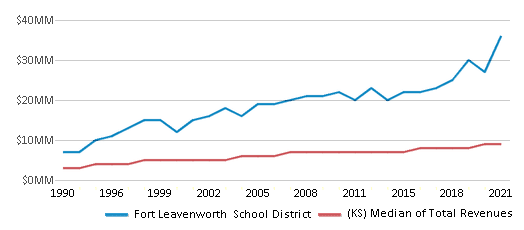
Spending
$46 MM
$8,211 MM
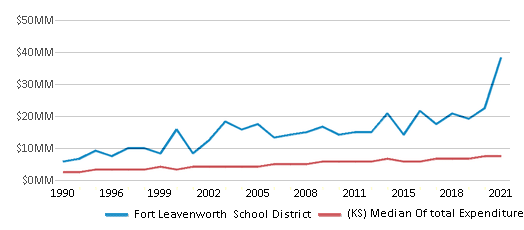
Revenue / Student
$21,929
$16,276
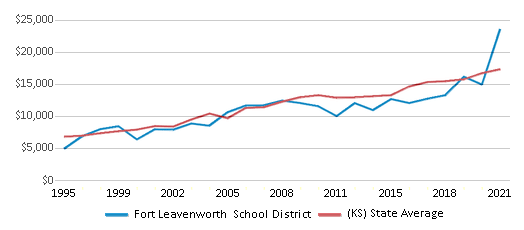
Spending / Student
$27,948
$17,192
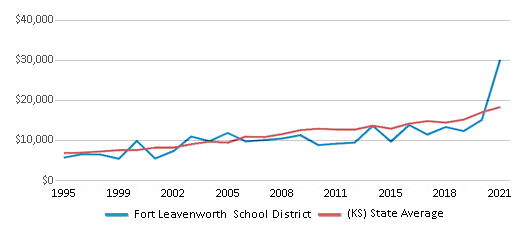
Best Fort Leavenworth School District Public High Schools (2025)
School
(Math and Reading Proficiency)
(Math and Reading Proficiency)
Location
Grades
Students
Rank: #11.
Patton Jr High School
(Math: 59% | Reading: 53%)
Rank:
Rank:
10/
Top 10%10
1 Patton Loop Bldg 326
Fort Leavenworth, KS 66027
(913) 651-7371
Fort Leavenworth, KS 66027
(913) 651-7371
Grades: 6-9
| 421 students
Recent Articles

Sexual Harassment at Age 6: The Tale of a First Grade Suspension
A six-year old in Aurora, Colorado, was suspended after singing an LMFAO song to a little girl in his class and reportedly “shaking his booty.” We look at the case and the sexual harassment problem in public schools today.

How Scaffolding Could Change the Way Your Child Learns
This article explores the concept of instructional scaffolding, a teaching method that enhances learning by breaking down complex tasks into manageable parts. It highlights how scaffolding supports students in developing critical thinking skills and becoming more independent learners. The article discusses the benefits of scaffolding, including improved engagement and reduced anxiety, and provides strategies for its implementation across various educational levels.

February 05, 2025
Understanding the U.S. Department of Education: Structure, Impact, and EvolutionWe explore how the Department of Education shapes American education, from its cabinet-level leadership to its impact on millions of students, written for general audiences seeking clarity on this vital institution.





